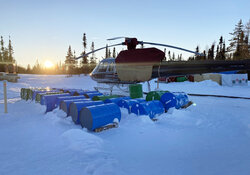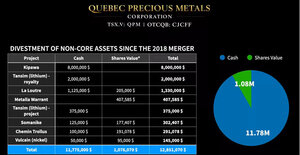Bob Moriarty: We are to the point where we are about 14 feet from going over the edge of Niagara Falls. We haven’t gone over the edge yet; we haven’t gone to a total collapse. We don’t have riots in the streets; we don’t have a revolution. That’s coming; that’s about two to three months off.
Here’s what we’ve got: the Fed has committed to $8.5 trillion of taxpayers’ money to bail out the worst run companies and banks. It hasn’t worked. Now, they’re at a 0% to .25% on the Fed Funds rate for funds for banks, which means if you go down and you pay $100,000 for a T-bill for 90 days, your return is zero, which is to imply that there is zero risk to investing with the government. Anybody who actually believes that is going to be in for a real shock in the first quarter of next year.
GM has lost has lost $80 billion dollars in the last four years. They’re burning through $2 billion a month when everything is going well. Their sales are down 37% in November; the mathematical probability of GM surviving is zero. But we’re going to pour more taxpayer money down that hole. AIG's also turned into the proverbial black hole. I would think that at $300 billion or $400 billion or $500 billion or $600 billion, somebody’s going to wake up and say, “You know, we’re losing a lot of money here.”
TGR: It’s getting to be real money at that point.
BM: What we have done is guaranteed hyperinflation in the United States. We have guaranteed the destruction of the United States. We will have riots starting in the first quarter of next year; we will default by the summer of 2009.
TGR: Default on how many of the bonds? All? Or just some?
BM: 100%. The US government is going to default. Treasuries, Fannie Mae, Freddie Mac, the whole lot. It’s the end of empire. The United States government will not exist in its current form a year from now.
TGR: When you say “its current form,” what form will it take?
BM: I don’t know. It’s a really good question. I’m sure it will be a total state of chaos. I mean we’ve never been here. I think the analogy of the Soviet Union is probably the closest; we could break up into a series of little fiefdoms. But here’s what’s important to understand—the United States government has failed at every single level. It is too big; it is too unwieldy; it doesn’t work.
TGR: So, what does it mean? We’ve got impending chaos in the United States—and the financial markets will continue to go downward. Are we talking globally or U.S.?
BM: U.S. primarily, but globally because the U.S. is so important. The U.S. is the linchpin right now, but the rest of the world is going to have to learn to get by without the United States. What George Bush and Dick Cheney have done is essentially destroyed the United States; they have bankrupted the country. We are going to end up having our troops march out of Iraq to the nearest border because we can no longer afford to pay for them. We’re going to go into Zimbabwe-type inflation where they’re printing off $200 million dollar bills to buy a loaf of bread.
TGR: Other than moving to a nice island in the Caribbean, what does an investor or a resident of the U.S. do?
BM: You have to prepare; first of all, it’s important to prepare mentally and that means doing some education. Second, you don’t want to be in debt. You don’t want to be buying real estate. You don’t want to be taking any chances financially whatsoever. You want to be investing in real resources: good solid producing gold companies or silver companies or energy companies. You want to really hunker down.
TGR: If the financial markets continue to get clobbered, I would assume the gold equity stocks would continue to get clobbered?
BM: I don’t think they will. Here’s what is going to happen. There is actually a lot of money sitting on the sidelines. I’ve heard there's billions of dollars waiting to be invested in resource stocks. Resource stocks are selling for 5 cents or 10 cents on the dollar; that’s not going to last for very long.
What I want to get across to everybody is and it’s very important, is that when you go through chaos, the worse it gets, the more inclined you are to solve it. There are some easy solutions to this financial situation in the United States.
First of all, we downsize; we stop spending all this money at the federal level; we stop spending money at the state level. We end up with a much smaller government that isn’t trying to make every decision for every person all the time. Big government doesn’t work any more. We need to change that. We need to go back to self-sufficiency; we need to go back to citizens participating in government.
We need to go back to Economics 101 where you invest to make money, save money. The gold companies that have the business model of print shares and drill, print shares and drill—those guys aren’t going to succeed. But the guys who have producing assets and real stories, they’re going to succeed beyond their wildest imagination.
We need to kill the Federal Reserve System and go back to honest money. That’s 90% of our problem right now. We are all playing at investing with Monopoly money backed by nothing. It’s about as smart as you sitting down at a high stakes poker game, you have a wad of $20 gold pieces and everyone else is playing with their Mobil Oil credit card. Those fools will bet on anything, it’s not real money.
TGR: Can they perform in a falling financial market?
BM: Of course.
TGR: Assuming gold is rising.
TGR: Do you see think a lot of these juniors have bottomed? A lot of the producers have doubled off of bottoms.
BM: Yes, they have actually—they bottomed in October. If you go back to what I was saying back then, I said we were at a bottom. They had definitely bottomed. The HUI has doubled since then and no one noticed.
The general stock market is going to be good until maybe January or February. But it’s going to get far worse after that. We have some real problems that will be surfacing between now and then. But there’s an enormous amount of money sitting on the sidelines waiting to go somewhere safe. When people realize that resource stocks are the only safe haven, they’re going to go up more than anybody can imagine.
So, there are two things I would do with new money. First of all, gold and silver serve as an insurance policy against chaos. If you cannot put your hands on some physical gold, physical silver, it’s like living without an insurance policy. When you need food, if you don’t have gold or silver, you’re going to be a bit shocked. Second of all as far as an investment program, beyond the insurance policy, you want to be in real assets. That’s gold or silver or energy producers or near-term producers, or companies with a good business model.
TGR: Any names you could share with us?
BM: Look at the recent Haywood Securities report, "Junior Mining: Report on Cash Sustainability." Now, 96 companies currently traded at discount to their last reported net working capital. This is the greatest opportunity to invest that I have ever read or heard about; it’s absolutely unimaginable. It’s not going to last very much longer, but stocks could move up. The really bad gold stocks are going to move up 500%.
Haywood Securities: Report on Cash and Sustainability: (12/19/08)
"Worthy of mention, based on cash (>$50 million) and market valuation (negative enterprise value (EV)"
- Nautilus Minerals (NUS-T): Cash: $282 million; NWC: $269 million; NWC/MCap: 182%; EV: -$134 million
- Nautilus Minerals (NUS-T): Cash: $282 million; NWC: $269 million; NWC/MCap: 182%; EV: -$134 million
- Northland Resources (NAU-T) : Cash: $123 million; NWC: $122 million; NWC/MCap: 213%; EV: -$66 million
- Aurora Energy (AXU-T) : Cash: $106 million; NWC: $105 million; NWC/MCap: 151%; EV: -$37 million
- Western Uranium (WUC-V) : Cash: $52 million; NWC: $51 million; NWC/MCap: 165%; EV: -$21 million
- US Energy (USEG) : Cash: $70 million; NWC: $67 million; NWC/MCap: 163%; EV: -$20 million
- UR-Energy (URE-T) : Cash: $64 million; NWC: $65 million; NWC/MCap: 139%; EV: -$19 million
- Geovic Mining (GMC-T) : Cash: $78 million; NWC: $76 million; NWC/MCap: 132%; EV: -$9 million
TGR: You mentioned that you looked at gold and silver as an insurance policy and recommend investing in real assets. Do you have a recommendation of a percentage of the portfolio that people should be holding in these? How much cash should they keep for future opportunities?
BM: Ah, very little. Cash is going to be the most dangerous thing you can invest in. Cash, T-bills, T-bonds are going away; they’re going to be worth zero. You’re going to walk into a bank one day and your ATM machine is not going to work, and your cash is going to be no good. I would think two to three months' living expenses, if you can do that in cash or silver, would be a very high comfort level. That percentage will change depending on what people have. Everybody—I really want to emphasize that—everybody needs to have some physical gold or silver.
TGR: Bob, you don’t see that we’re going to get this hyperinflation kicking in or it’s going to be so short, it won’t matter?
BM: Hyperinflation is starting to kick in now. I think you’re going to see it turn shortly. The government has been flooding the system with money and in short order it’s going to try to find a safe haven. Here’s what to look for. If you take a look at a chart right now, the 10-year, 30-year bonds have gone curve linear. They’re going straight up to the moon. Any time a market does that, it’s about to crash. When the bond market crashes, it’s going to be 15 on the Richter scale. It’s going to be enormous. It’s far more dangerous than the stock market crashing. When the bond market crashes, the hyperinflation starts.
TGR: And what’s your timeline on that? You were saying before, January or February?
BM: The bond market is literally going to start crashing any day now. I mean it’s very, very soon. I think that the stock market is good through January or February. I think the resource market will start up in an explosive way literally in a few weeks or so. It’s actually going up now. If you go back the last month or six weeks, it’s gone up a lot more than anybody would believe. Everybody thinks, “Well, my gold stocks are all down, I’m going to lose money hand over fist.” But they’re actually 50% better off now than they were in October.
TGR: Bob, earlier you mentioned investing in real assets. You said gold and silver and energy producers. That’s a pretty broad-based statement; could you give us an idea of what you mean when you say energy producers?
BM: Coal producers, oil producers, natural gas producers—energy is absurdly cheap now; it was absurdly expensive at $147. You can buy energy producers really cheaply, and I have written up a number of them on 321energy.com. I like anything real, anything that’s based on Economics 101. We’re going to take something of value and we’re going to increase its value, and we’re going to sell it to the public for a profit. That’s just a really good business model.
Here’s what I want to emphasize, and what’s important to get across—I don’t want to sound like I’m totally negative because I’m not totally negative. The worse it gets in the United States, the more impetus there will be to say, “Hey, what caused this in the first place? And what can we do to prevent it in the future?” And the answer to that is quite simple. We got off the gold standard in 1933 and in 1971, and that let government grow totally out of control. We need to rein government in; we need to go back to government of the people, by the people, and for the people. The way to do that is to go back to a gold and silver based currency. Once we do that we can start investing with some kind of common sense.
TGR: So the good news is that through all this chaos there will be some change in the way the government operates?
BM: Government will be much smaller; I think that any rational American can look at big government and say, “Hey, wait a minute. This doesn’t work.” And the funny thing is it’s not because I’m a liberal or I’m a conservative. I’m not sure there is any such thing as a perfect liberal or a perfect conservative, even though we act like they’re two totally different things. Big government doesn’t work; we need to go back to Economics 101 and only spend the money that you earn.
TGR: OK, other than getting mentally ready, getting into gold and silver and real assets, do you have any other thoughts on where to put our cash if we have any cash right now? What about other commodities, such as food commodities?
BM: Absolutely. I believe in peak oil, and peak oil is an analog of peak food. So, it requires X number of calories of energy to produce X number of calories of food, so when you run out of cheap energy, you run out of cheap food. Americans are going to be very angry. We have a very dangerous system in the United States where we essentially have a day and a half’s worth of food in our food stores. It’s a just in time now system. And it’s very vulnerable to civil disorders.
TGR: Is there an investment play within the food component?
BM: I think anything in food. Strangely enough, what I like is fertilizers. Fertilizers are a real cheap way of betting on food. Some of the big food companies, like R Gill, are just as corrupt as everybody in Washington, everybody in Wall Street, so I can’t recommend them. I don’t know that big food stocks are good, but maybe equipment manufacturers would be a good bet.
TGR: Bob, do you think there’s any gold in Fort Knox?
BM: That’s a really good question. I hope there is. But I don’t know. The really interesting thing is nobody in the government has ever even pretended that they might do something with it. If it was me, I’d go count the bars; I’d figure out who owns them and I’d come up with some kind of currency tied to gold, you know—1 gram notes, and 5 gram notes and 10 gram notes. I think mathematically there probably isn’t, but I don’t know. Nobody knows.
TGR: And there’s no accountability?
BM: Ah, are you kidding? George Bush is president of the United States.
TGR: Yes, but soon he won’t be. You know, I’ll write a letter to Obama and ask him. Well, Bob, as usual, it’s always great to do these interviews. We appreciate it.
Bob Moriarty and his wife, Barb, launched 321gold.com as a private website seven years ago, when they were convinced gold and silver were at a bottom and wanted to help others understand what they needed to know about investing in resource stocks. Since then, they’ve introduced a second resource site, 321energy.com. Bob travels to dozens of mining projects a year. He was one of the first analysts to write about NovaGold, Northern Dynasty, Silver Standard, Running Fox and YGC Resources, among others. Prior to his Internet career, Bob was a Marine F-4B pilot at the age of 20 and a veteran of over 820 missions in Viet Nam. Becoming a Captain in the Marines at 22, he was one of the most highly decorated pilots in the war.
Want to read more exclusive Gold Report interviews like this? Sign up for our free e-newsletter, and you'll learn when new articles have been published. To see a list of recent interviews with industry analysts and commentators, visit our Expert Insights page.








































